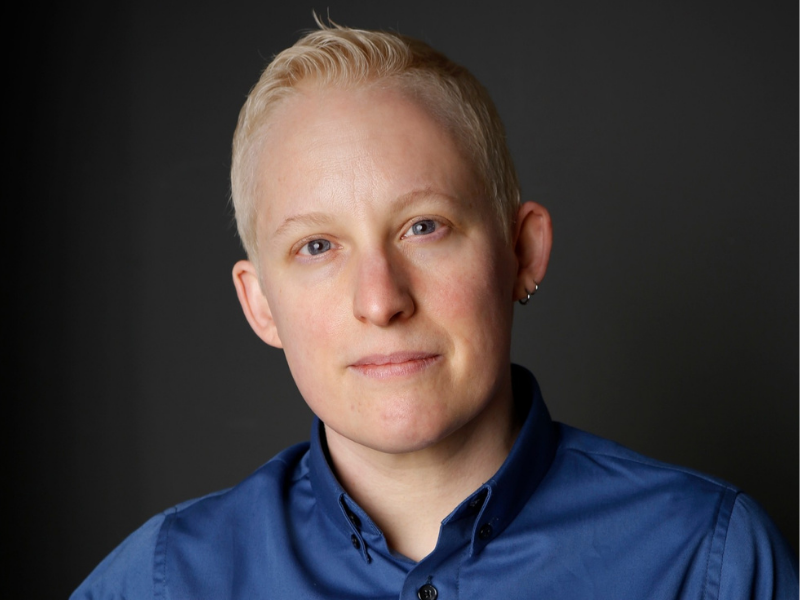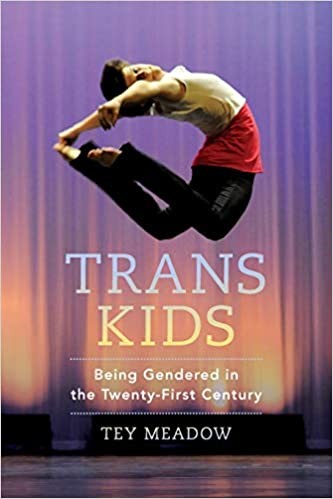Faculty Profile: Tey Meadow
Tey Meadow, Associate Professor of Sociology, spoke with us about her recent projects and her hopes for the future of the LGBTQ+ Scholarship Initiative.
Congratulations on getting tenure! How does it feel?
Honestly, I have no idea how I feel. Obviously, the process of waiting is very stressful, and even when one imagines it's going to go well, you never know. And so there's a certain amount of relief, but I'm a little shell shocked. Now I can think about being in New York long term, and I'm contemplating moving closer to campus now that I know that my job is secure.

As far as my scholarship is concerned, I've been doing the work I want to do all along, and have not had to compromise in that area for the sake of getting tenure.
What projects are you working on now?
I have a few projects for the summer, spin-offs of my book Trans Kids: Being Gendered in the Twenty-First Century. We’re waiting to hear back about a journal article I did with a graduate student. It was a big survey experiment to test one of the things I found in the book about people being more likely to classify feminine boys as trans than masculine girls. That is, in fact, what we found, and there are some complexities to that.
I’m also working with a psychologist at Princeton on some research that's tailored to speak directly to some of the more political debates around teenagers, medicalization, and school inclusion and things like that. We're doing an interview study. I'm just waiting for Columbia to approve our IRB, and then we're going to start interviewing. We have a whole team of students working with us on that project.
I am writing up my new ethnographic book, which is on BDSM subcultures and social difference and the way sexuality and social difference are coming together in this particular cultural moment. That book is still in process, but I have a few articles to submit over the summer from that project as well.
What classes have you been teaching?
I have been teaching Queer Theory for the Institute for the Study of Sexuality and Gender every year. It’s a class which I really love and which is so popular with students that it is always oversubscribed. I also teach The Sociology of Sexualities—both grad and undergrad. I put together a new kind of qualitative analysis training for our graduate students, which has been a lot of fun. I launched two monthly workshops for graduate students to share their work. One is specific to gender and sexuality and one is more for people doing qualitative work.
I noticed that you graduated from Barnard in the late ‘90s. In the time since you've been a student, how has LGBTQ+ life sort of changed on campus, whether for faculty or students?
When I was a student, there was no resource list for gay anything. Whatever we had, we built ourselves. I don't know if my students would agree that [my experience] had some benefits to it, in the sense of a feeling of cohesion and collectivity and struggle that they don't really experience. They kind of approach LGBT campus life from a consumer perspective, and I see a sadness in that part of the transition. On the other hand, I had beer bottles thrown at me in the neighborhood, so I'm really grateful that students have a little bit of an easier city to live in than I did. I was also a gender studies major at Barnard, and I learned queer theory there, and I think that the students in my queer theory class this year are every bit as excited about the material as we were. It's really fun to watch students see themselves reflected in the intellectual material that they're engaging with.
"When I was a student, there was no resource list for gay anything. Whatever we had, we built ourselves."
The world beyond campus is also such a different place. Students can turn on the TV or Netflix or whatever and see movies about gay people. When I was younger, there was one movie at the local Blockbuster, which I watched 100 times.
What do you see as some of the challenges that Columbia still has yet to overcome in the experience of LGBTQ+ faculty?
I think that the LGBTQ+ cluster hires are really important, but I don't think it's enough. The fact that you can't have a [tenured] line in gender studies is a big problem. I think that we don't have enough faculty to meet the student demand for the coursework, and that's a quality of life issue for both faculty and students. Having dedicated lines for gender and sexuality studies would make a huge difference, both in having faculty who can contribute to the emotional labor of being queer faculty on campus, and those who can contribute intellectually to the material labor of making their work accessible to students. We are constantly scrambling to just offer the basic courses that folks need for concentrations, so I think that's really the single biggest limitation we have.
What opportunities might the expansion of the LGBTQ+ initiative represent?
I mean, as somebody who has my line in sociology, I also understand that many departments feel that if they apply for faculty lines in this initiative it's going to take away from what else they can do, and it requires departments to prioritize LGBT scholars and scholarship in ways that you know, I think, maybe may cut against the intent of the program. I think that really clarifying that this is extra, and actually meaning it, would be an important step. You can have this and the other thing you want, and you just get a “bonus” gay.
I mean it always all comes down to money, because you can budget for programming. If I had a whole bunch of money to bring speakers to campus, I would also need money to have a grad student organize it. Otherwise, it's just like another job for me. From my perspective, having a rich intellectual life on campus involves inviting people from outside to give talks. Having faculty whose primary job is to do this kind of work and mentor students is important.
Speaking of bringing in outside scholars, I know that the Queer Disruptions conference has kind of been disrupted itself, but in imagining the next iteration of it, what would you envision?
It was a bit of a conference without a thought architecture, so we need a clear vision of what it is supposed to be. We all came together to put it on, but none of us knew what it was really about. I think in some ways it might be good to have one or two people share it from their disciplinary perspective, so that it can have an intellectual architecture that makes sense. That could rotate instead of having four different panels that different people with completely different commitments are doing.
Maybe one year it's at the public health school, and maybe one year it has a social science focus, or maybe a focus on race and sexuality, and everybody contributes in such a way that it has some coherence to it. I think that could be good. We could think of a title that fits with the content.

